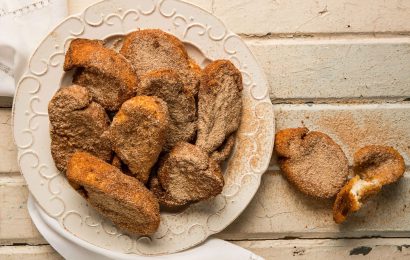It seemed to be an ordinary Monday, the cook was starting to organize the weekly routine when his mobile rang. “‘Good morning, Raphael, I am speaking in the name of Michelin Guide, how are you? I am calling to inform you that your restaurant was awarded with one star in the guide. Congratulations!’ And hung up!”, recalls Raphael Rego, from Oka, in Paris. With this fact, on Monday (21st of January), the restaurant became the only Brazilian food restaurant abroad to be part of the well-known and world’s oldest gastronomic guide, that was created in 1900, in France. The chef, from Rio de Janeiro but living in Paris for over a decade, became the first Brazilian to appear in the Michelin France.
“The call hardly lasted five minutes. I hung up and got paralized. I finally got something I really wanted… So now what? It was a feeling close to the one I had when I discovered I was going to be a dad. A mix between happiness and fear.”
Becoming a father was a breaking point for the chef and when he started to worry more about bringing Brazilian culture to his house and his food. “I didn’t want him to grow up only eating croissant, pain au chocolat, ratatouille, mashed apples. I am Brazilian and my kid deserves to know these roots too, deserves to eat pastel, moqueca, açaí.” And then the desire of starting over arouse.
New beginnings are a constant in the chef’s life, since he left Brazil at 19 to study marketing in Australia. It was there, in a job at a restaurant, that he decided to work in the kitchen and go to Paris. In 2008, Raphael arrived in Paris without speaking French. It was a personal battle for him to get a job and to study – at Ferrandi, a well-known cooking school. While working at Michelin starred restaurants – including the master Joel Robuchon – he started to be respected in the French high gastronomy.
After his son’s birth, he started to think more carefully about Oka’s project. With the negative answer for a bank loan he asked himself: “Why open a Brazilian restaurant if I have lots of experience in famous French restaurants? And why not a place that will not serve the Brazilian classics, such as feijoada and caipirinha, which the French people already know and like? To have an authorial project, using unknown products seemed a very crazy idea”.
Raphael didn’t give up. He got his and his wife’s (the French citizen, Sophie) savings together and opened Oka, a small house with 30 square meters, in 2014. There he served sweet pirão (a type of mush) with coconut milk, coriander ice-cream and feijoada foam. The French didn’t understand this and the restaurant took a while to take off. That’s when a French food critic published an article explaining “Raphael’s Brazil”. Shortly after that, he got an indication in Bib Gourmand selection as a good deal restaurant from Michelin Guide in 2015. This validated his author’s Brazilian cuisine and was a stimulus for him to seek the star.
Raphael moved his restaurant to a bigger place and decided to cross Brazil from North to South to research and find producers. Five months after opening the restaurant, he needed to close it for a renovation. “It was very hard for me, I even thought about quitting. It was too much stress. But my wife made me see that our family was making a sacrifice for me over those last years and I could not give up just because of a six month reconstruction”, he says, thankful for this advice. I rediscovered myself and went into a project that is now recognized by Michelin, even with some characteristics which are not approved by the guide, such as loud music and a chef that walks through the restaurant, chatting with his clients joking and laughing. I am Brazilian here. And I am happy to be a small part of this movement that promotes our cuisine all over the world”, he says.
Today Oka imports some 90 Brazilian products such as manioc, tucupi, jambu, rapadura, amburana, coconut oil and a variety of flours from different Brazilian regions. He also cultivates some species and uses a “biquinho” pepper made by a producer in South of France, who got the seeds from Raphael. His next challenge? To make cooks all over the world look at Brazil’s diversity and accept to pay for it. “Why does everybody think that it is ok to pay 2500 euro for a truffle but 90 euro for a liter of tucupi is expensive?”.



